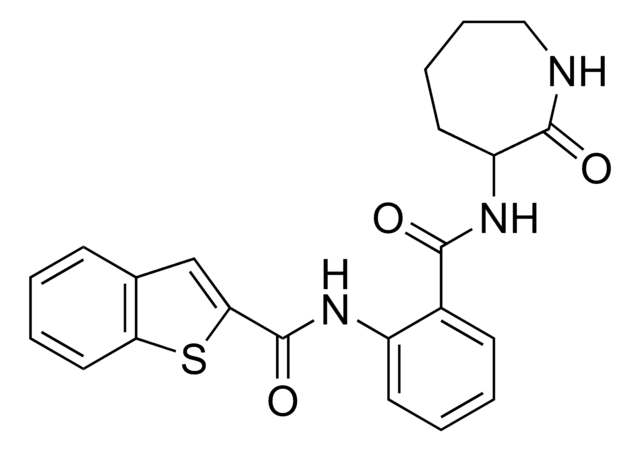About This Item
Recommended Products
biological source
Nonomuraea longicatena
Quality Level
Assay
≥98% (HPLC)
form
solid
solubility
DMF: 1 mg/mL
DMSO: 1 mg/mL
antibiotic activity spectrum
viruses
Mode of action
enzyme | inhibits
shipped in
dry ice
storage temp.
−20°C
SMILES string
[H][C@]12C[C@](O)(C(=O)OC)[C@](C)(O1)n3c4ccccc4c5c6CNC(=O)c6c7c8ccccc8n2c7c35
InChI
1S/C27H21N3O5/c1-26-27(33,25(32)34-2)11-18(35-26)29-16-9-5-3-7-13(16)20-21-15(12-28-24(21)31)19-14-8-4-6-10-17(14)30(26)23(19)22(20)29/h3-10,18,33H,11-12H2,1-2H3,(H,28,31)/t18-,26+,27+/m1/s1
InChI key
KOZFSFOOLUUIGY-SOLYNIJKSA-N
Gene Information
human ... NTRK1(4914)
rat ... Prkca(24680)
Looking for similar products? Visit Product Comparison Guide
Application
- as a tropomyosin receptor kinase (Trk) inhibitor to study the role of TrkA signaling in rats
- as a Trk inhibitor for inducing in vitro injury in retinal Müller glial cells to study the effects of cord blood serum (CBS)
- as a general protein kinase inhibitor to study its effect on in vitro human somatic testicular cell reassembly
Biochem/physiol Actions
related product
Storage Class Code
11 - Combustible Solids
WGK
WGK 3
Flash Point(F)
Not applicable
Flash Point(C)
Not applicable
Personal Protective Equipment
Certificates of Analysis (COA)
Search for Certificates of Analysis (COA) by entering the products Lot/Batch Number. Lot and Batch Numbers can be found on a product’s label following the words ‘Lot’ or ‘Batch’.
Already Own This Product?
Find documentation for the products that you have recently purchased in the Document Library.
Our team of scientists has experience in all areas of research including Life Science, Material Science, Chemical Synthesis, Chromatography, Analytical and many others.
Contact Technical Service







